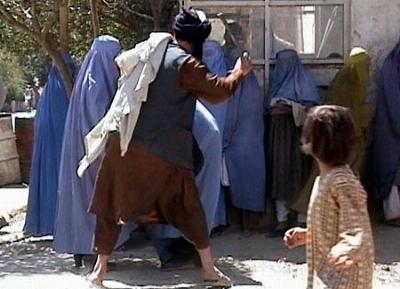Share
Human Rights Voices
While the UN devotes its human rights operations to the demonization of the democratic state of Israel above all others and condemns the United States more often than the vast majority of non-democracies around the world, the voices of real victims around the world must be heard.
Afghanistan, December 14, 2022
Taliban Publicly Flog 27 Afghan Men, Women Convicted of ‘Moral’ Crimes
Original source
Taliban authorities in southern Afghanistan publicly flogged 27 people, including two women Wednesday, for allegedly committing theft, adultery and other crimes.
Officials and residents reported the punishments were administered in the southern Helmand and Zabul provinces.
Mohammad Qasim Riyaz, a provincial government spokesman in Helmand, said 20 men were lashed in the sports stadium in the provincial capital, Lashkar Gah.
Riyaz said that each man was flogged between 35 to 39 times before a large number of spectators, including provincial Taliban officials, religious clerics and local elders. Some of the convicts were additionally given prison terms, he added.
Separately, the Taliban-run state news agency reported public flogging of five men and two women for “illicit relationships, robbery and other crimes” in Qalat, the capital of Zabul. It did not elaborate.
Afghanistan’s hardline rulers have flogged dozens of men and women in crowded football stadiums in several provinces and the capital, Kabul, in recent weeks, applying their strict interpretation of Islamic law to criminal justice.
Wednesday’s public lashings come a week after the Taliban carried out their first public execution of a convicted murderer since taking control of the conflict-torn impoverished South Asian nation.
Taliban officials said the execution, carried out with an assault rifle by the victim’s father, was staged in a crowded sports stadium in western Farah province in line with "qisas" — an Islamic law stipulating the person is punished in the same way the victim was murdered.
The execution drew international criticism and denunciation, with human rights groups demanding an immediate end to public punishment of convicts.
“Treating criminal proceedings as sporting events is an affront to the dignity & human rights of all Afghans,” Karen Decker, the charge d’affaires of the United States mission to Afghanistan, wrote on Twitter while condemning the execution in Farah.
Taliban spokesman Zabihullah Mujahid rejected the outcry as “disrespect” to Islamic law.
"The fact that Afghanistan is being criticized for applying Islamic sentences shows that some countries and organizations have either insufficient knowledge or have problems with Islam, respecting Muslims' beliefs and laws," Mujahid stated.
"This action is an interference in the internal affairs of countries and is reprehensible.”
The Taliban began implementing public punishments early last month, when their reclusive supreme leader, Hibatullah Akhundzada, ordered judges to fully enforce Sharia.
Since seizing power in August 2021, the Taliban also have tightened restrictions on Afghan women, effectively limiting their access to public life and education.
Teenage girls are not allowed to attend school beyond the sixth grade across most of Afghanistan.
The polices, especially their treatment of women, have effectively blocked the Taliban’s efforts to secure legitimacy for their male-only government in Kabul.
U.S. State Department spokesman Ned Price last week cautioned the Taliban against bringing back the “regressive and abusive practices” of their previous rule in Afghanistan from 1996 to 2001.
"It was an affront to the dignity and the human rights of all Afghans then; it would be an affront to the dignity and the human rights of all Afghans now. It is a clear failure by the Taliban to uphold their promises," Price told reporters in Washington.
Amnesty International denounced the public execution and flogging, saying the Taliban "continue to flagrantly flout human rights principles with complete disregard for international human rights law."
The former insurgent group returned to power in August 2021 as the United States and NATO partners withdrew from Afghanistan after 20 years of war with the Taliban.

